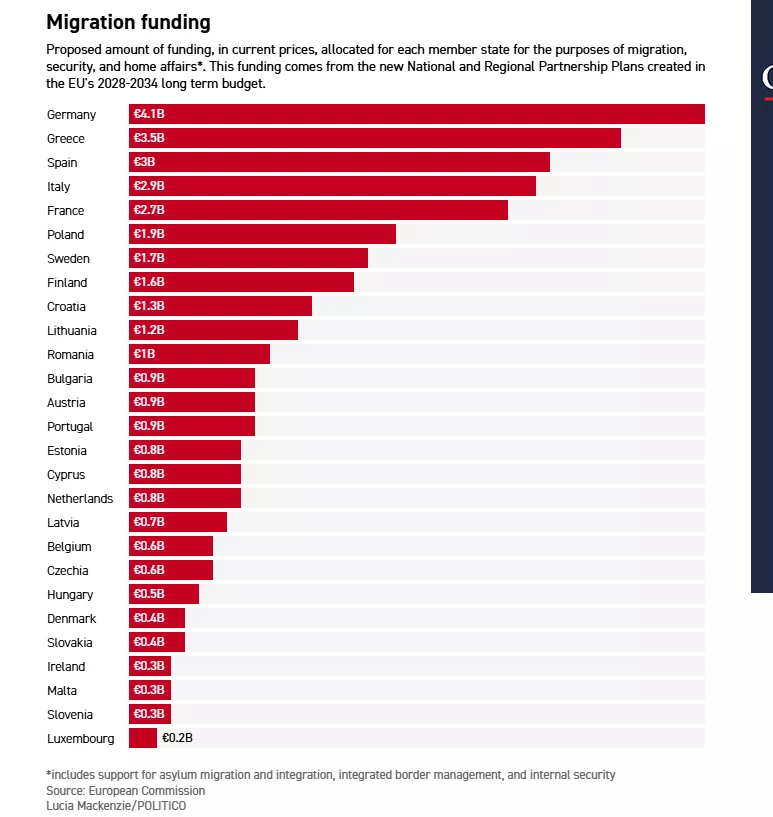Ink has just dried up on the budget of the European Commission budget of 1.8 trillion euros for the period after 2027 and the counting of winners and lost has already begun.
The national governments make a fund and Politico records the first data.
The big winner
Poland has been unquestionable winner in the context of so -called national and regional partnership plans – a new € 865 billion -euro funds that merges agricultural, regional and migratory funds and is the largest part of the new budget plans.
Warsaw is set to receive € 123.3 billion from this budget, more than € 30 billion more than the next largest beneficiary, France.
Polish budget Commissioner Serafen appeared in a video outside the Commission’s headquarters with European Affairs Minister Adam Slapka on Thursday night, welcoming what he called “the biggest, most ambitious EU budget in history”, saying that “
Slapka, framed by Berlaymont’s glass facade, threw a sponds into the nationalist opposition of law and justice (PIS), saying that under PIS’s governance, “money for Poland’s cohesion were blocked”, a reference to the money. Law.
Polish Prime Minister Donald Tusk, who is facing increasing pressure from a fragmented coalition inside his country, is exploiting the EU budget as proof that his government can achieve results. His camp hastened to claim credit for the funds and the restoration of Poland’s image in Brussels.
However, Poland was already by far the largest beneficiary of the EU’s agricultural and regional payments under the latest EU budget. Between 2021 and 2027, Poland has been or will have or will be allocated or will be allocated to current prices.
The regional aid aimed at reducing the gap between richer and poorer regions in Europe, are distributed on the basis of the national and regional level of growth. The basic principle is that the poorest countries and regions receive a greater share of money.
Agricultural aids are largely granted on the basis of the extent of the cultivated agricultural land, favoring countries with large agricultural sectors.
The losers
Unlike the festivities in Warsaw, in Budapest there were ridicule, as Hungarian Prime Minister Victor Orban denounced the EU’s next budget as a “Ukrainian rescue”. “What is left? Less than ever. I will never support this, “Orban said in an interview posted on his X account.
Germany also opposed the proposal, describing the overall size of the “unacceptable” budget in an era of fiscal tightening.
“We have to remain completely landing when it comes to budget,” Finance Minister Lars Clingbell said on Thursday. Chancellor Friedrich Mertz added that Berlin “will not be able to accept” the plan as it is.
Germany, which is about to receive 68.4 billion euros in national and regional plans, is essentially the column of the current EU budget. In 2023 Berlin paid 33.8 billion euros and received 14 billion euros back, recovering only 41 cents for each euro.
In addition, the committee’s plans also show who Brussels trusts to handle sensitive issues. Germany, Greece and Spain are at the top of funds for immigration, security and border management, with € 4.1 billion, € 3.5 billion and 3 billion euros respectively.
Farmers
In the meantime, concerns about the plan to integrate agricultural funds into broader national programs are increasing.
According to the proposed budget, agricultural expenditure is nominated by more than 20%, from 386.6 billion euros to the current budget to € 300 billion in the next, which prompted farmers across Europe to denounce the new plan as “treason”.
Although Serafen insisted that immediate payments to farmers would remain stable, many fear that inflation would substantially reduce the value of this support.
The budget proposal “is a good starting point for exchange of views,” Polish Szłapka said on Friday, mitigating previous criticism of the committee’s plans to reform the budget.
“Cohesion and agriculture must remain strong and must be adequately funded,” he added during a meeting of European ministers in Brussels.
Source: Skai
I am Janice Wiggins, and I am an author at News Bulletin 247, and I mostly cover economy news. I have a lot of experience in this field, and I know how to get the information that people need. I am a very reliable source, and I always make sure that my readers can trust me.











